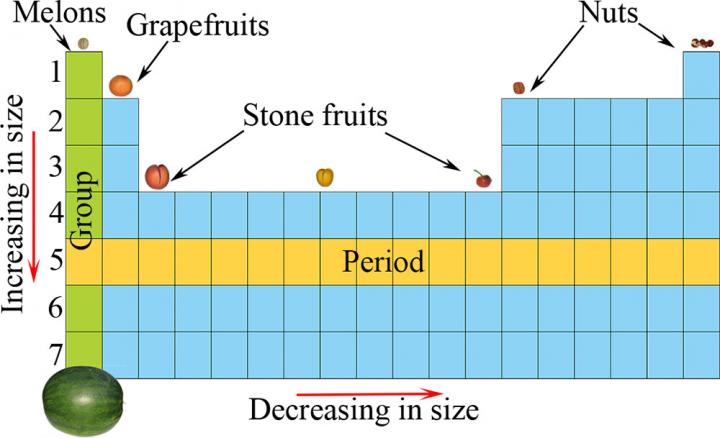
Credit: Adapted from Journal of Chemical Education 2020, DOI: 10.1021/acs.jchemed.0c01143
Many students, especially non-science majors, dread chemistry. The first lesson in an introductory chemistry course typically deals with how to interpret the periodic table of elements, but its complexity can be overwhelming to students with little or no previous exposure. Now, researchers reporting in ACS’ Journal of Chemical Education introduce an innovative way to make learning about the elements much more approachable — by using “pseudo” periodic tables filled with superheroes, foods and apps.
One of the fundamental topics taught in first-year undergraduate chemistry courses is the organization and layout of the periodic table of elements. However, many university students consider it a daunting and difficult subject to master, prompting professors to seek new ways to engage their students and make its concepts more accessible. Previous educational studies presented the table in different formats, such as crossword puzzles and cartograms, to address multiple types of learning styles. Gregory Watson and colleagues reasoned that introducing the periodic table with familiar items could also help. And rather than teaching the full details right away, the researchers wanted to focus on some of its key characteristics first, using a contemporary, engaging and multi-level strategy.
The team presented first-year chemistry students with a series of made-up, or pseudo, periodic tables with objects that they had likely encountered before, including fruits and nuts, superheroes, iPad apps and meats. The pseudo periodic versions replaced elements with single items to demonstrate one or more concepts needed to understand the trends and layout of the real chemical one. For example, a superhero table featured characters, such as Superman, Wonder Woman and the Green Lantern, prompting in-class discussions on how to group the icons by ability, strength, gender and other properties — just as the elements are arranged in the real periodic table based on their similarities. Over 75% of students taught with this strategy identified it as somewhat, very or extremely useful. An increase in correct answers relating to the subject on midterm exams suggested that these periodic tables improved students’ comprehension. The researchers say that the familiar items reduce stress and help students successfully build their base of chemistry knowledge.
###
The authors do not acknowledge a funding source for this study.
The abstract that accompanies this paper is freely available here.
The American Chemical Society (ACS) is a nonprofit organization chartered by the U.S. Congress. ACS’ mission is to advance the broader chemistry enterprise and its practitioners for the benefit of Earth and its people. The Society is a global leader in providing access to chemistry-related information and research through its multiple research solutions, peer-reviewed journals, scientific conferences, eBooks and weekly news periodical Chemical & Engineering News. ACS journals are among the most cited, most trusted and most read within the scientific literature; however, ACS itself does not conduct chemical research. As a specialist in scientific information solutions (including SciFinder® and STN®), its CAS division powers global research, discovery and innovation. ACS’ main offices are in Washington, D.C., and Columbus, Ohio.
To automatically receive news releases from the American Chemical Society, contact [email protected].
Follow us: Twitter | Facebook
Media Contact
Katie Cottingham
[email protected]




